Clinical trials are a team sport – with doctors, nurses, staff, and patients all working together.
The Clinical Research Center of UConn School of Medicine and its people continue its vital work day-in and day-out nurturing time-consuming clinical trial research forward, over years and years, catapulting them finally across the finish line to bring hope and promising new therapies to patients in need.
One major success is the CRC and its patients’ participation in a global clinical trial leading to this August’s FDA-approval of the first-drug ever for bronchiectasis. Prior to this, there were no medications to treat patients with the debilitating, chronic, inflammatory lung condition.
The new once-a-day pill is called Brinsupri (brensocatib). It’s FDA-approval follows results of the global clinical trial spanning five continents with over 1,700 bronchiectasis patients published this April in the New England Journal of Medicine.

Senior NEJM study author was Dr. Mark Metersky, who specializes in bronchiectasis care and is the longtime director of UConn’s dedicated Center for Bronchiectasis Care at UConn Health. He also served on the Steering Committee for the multi-center, randomized clinical trial. Several of Metersky’s patients were participants in this groundbreaking clinical trial for which he served as principal investigator for UConn’s clinical trial site in the CRC for both Phase II that started in 2018 and Phase III that started in 2021.
“Brinsupri (Brensocatib) is a very promising new treatment for bronchiectasis,” says Metersky. “This drug will help many patients living with bronchiectasis and improve their quality of life. This medication is now providing hope for so many patients suffering with daily symptoms.”
Clinical trial results showed the medication targets inflammation and significantly lowers the annualized rate of exacerbations in patients while also slowing their loss of lung function. Also, nearly half of patients in the clinical trial remained exacerbation-free one year later.
“Brinsupri (brensocatib) is a groundbreaking treatment for non-cystic fibrosis bronchiectasis in patients aged 12 and older. This is a major advancement in respiratory care—and the Clinical Research Center played a pivotal role in the clinical trials that led to this approval,” applauds Elizabeth Laska BSN, RN, CCRC, nurse manager of the Clinical Research Center at UConn.
The contributions and commitment of Sheila Thurlow, MSN, RN, the CRC’s dedicated study coordinator, were also instrumental to the success of the medication’s Phase III trial at UConn Health.
“This is an exciting first of its kind drug for the care of bronchiectasis. We are so excited for the FDA-approval of this Brinsupri that we helped study in clinical trial at UConn Health. This is exactly what we do at our Clinical Research Center!” proudly exclaimed Thurlow.

Thurlow adds, “CRC is a true team. We provide all resources a busy clinician like Dr. Mark Metersky needs for a clinical trial whether it is sponsored by the NIH or industry. Research nurses often build strong relationships with participants, guiding them through complex protocols and ensuring their safety and comfort. While most investigational drugs do not make it to market, the ones that do often represent major breakthroughs. Clinical trial testing of experimental drugs like this can take many years, but it is so worth it to help patients!”
Thurlow says that after this clinical trial ended bronchiectasis patients kept asking her for updates. Now this clinical trial nurse and other health providers have a very exciting answer for patients: If you have bronchiectasis and are a candidate for this treatment, your pulmonologist can order it now!
Thurlow is very grateful to have the opportunity to work with Metersky on this pivotal clinical trial really making a difference in the lives of patients.
“Dr. Metersky is a great principal investigator who is so well-seasoned, well-versed, and well-known. It was a wonderful experience and privilege working with him on this impactful, global clinical trial that is changing lives for the better,” Thurlow says.
Thurlow knows it’s a lot to ask of patients to be in a clinical trial but says patients are so appreciative and grateful to be given hope in their health struggles and also in turn help others like them.
Bronchiectasis patients are really special people, says Thurlow and the CRC team who are all thrilled that these patients can now be offered more than just symptomatic care.
“This drug is really novel, and it’s exciting. Wow, our UConn clinical trial research is really making a difference in the lives of patients,” says Thurlow.
The CRC is currently providing support for over 80 trials which include testing new medications for epilepsy and Parkinson’s disease, and others for gastroenterology conditions.
Thurlow earned her nursing degree at UConn School of Nursing and did some of her clinical nursing training at UConn Health. She saw an Ad in the Hartford Courant 24 years ago seeking a nurse in research at UConn Health. She applied, interviewed, and got the job!
“I love it here!” says Thurlow who had the privilege of working most of her UConn career with the late physician-scientist Dr. Cheryl Oncken, former chair of the Department of Medicine as well as the Program Director of the CRC. “You get to meet so many people working in clinical trial research especially patients – and you get to collaborate with so many brilliant people too. The CRC fosters a rich team based collaborative environment where my nursing expertise is highly valued.”
Improving Patient Lives

One of the many volunteering patients of the CRC’s clinical trials is a grateful patient named Cindy. She’s been living with bronchiectasis, a condition she had never heard of prior to her diagnosis, for two decades.
“Living with it has been really difficult, as there is no cure,” Cindy says and the condition’s chronic inflammation to lung tissue even led to her lung needing surgery.
“I’ve been in the hospital too many times,” Cindy shared. “But during the clinical trial I felt better and the whole experience was good.”
She heard the great news of the FDA-approval of the new drug and is looking forward to getting the medication as a prescription.
“I’m really excited,” says Cindy. “Dr. Metersky has been wonderful. A lot of bronchiectasis patients are referred to him.” In fact, Cindy found out about Metersky’s great expertise in the condition over 10 years ago. She then gathered her medical records and switched her care to UConn Health from another area hospital.
“Sheila the clinical trial nurse at UConn Health is really, really lovely and easy to interact with and talk to too,” says Cindy. “I’ve been doing clinical trials for my lung condition for so long. But if it’s going to help me, I would recommend clinical trials to other patients to help them too.”
Insmed, Inc. is the drug’s manufacturer and sponsored the clinical trial.



